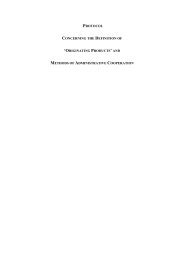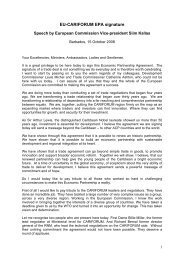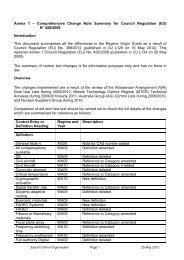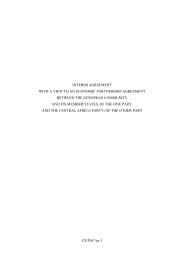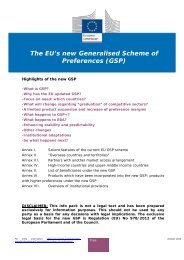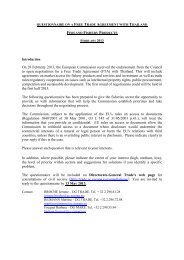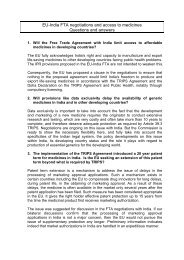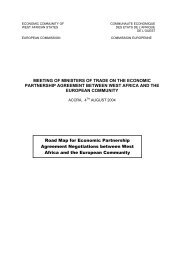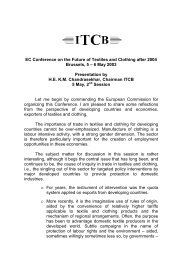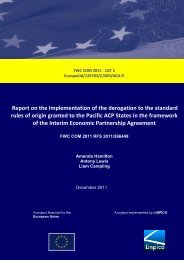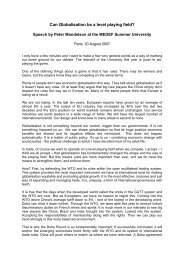Agricultural Commodity Chains, Dependence and Poverty
Agricultural Commodity Chains, Dependence and Poverty
Agricultural Commodity Chains, Dependence and Poverty
You also want an ePaper? Increase the reach of your titles
YUMPU automatically turns print PDFs into web optimized ePapers that Google loves.
Trade is the debate it has stimulated at consumer level. However, the mainstreaming of FairTrade as a code is unlikely as MNE’s often do not accept certain of its basic tenets such asminimum prices. Nevertheless, many companies <strong>and</strong> private sector organisations are nowdeveloping their own codes of conduct relating to labour issues, human rights <strong>and</strong>environment, as part of their policies on corporate social responsibility (CSR). Although thesecodes may be less ambitious, they have the potential to increase the number of commodityproducers benefiting from them <strong>and</strong> so should be encouraged. Furthemore, large companiesshould be encouraged to mainstream sustainable production practices into corporate practiceon the whole rather than as special br<strong>and</strong>s marketed alongside other br<strong>and</strong>s not benefitingfrom these codes.The Commission supports an integrated approach to sustainable trade that promotes all threepillars of sustainable development equally. A socially sustainable model of production meansthat working conditions comply with core labour st<strong>and</strong>ards (as defined by the ILOconventions). This includes the prohibition of child labour, forced labour, non discriminationin employment, freedom of association <strong>and</strong> collective bargaining in order to ensure decentworking conditions. Environmental concerns relate e.g. to maintaining soil fertility,preserving scarce water <strong>and</strong> other resources, eco-systems <strong>and</strong> biodiversity. In addition,environmentally sound production is crucial from a health perspective. It reduces producerexposure to dangerous pesticides, preventing pollution of water reserves etc.. The long-termeconomic costs of production should be covered.In its communication concerning Corporate Social Responsibility 12 , the Commission providedoverall guidelines for the development of effective <strong>and</strong> credible codes of conduct. It believesthat such codes should: build on the ILO fundamental Conventions <strong>and</strong> the OECD guidelinesfor multinational enterprises as a common minimum st<strong>and</strong>ard of reference; includeappropriate mechanisms for evaluation <strong>and</strong> verification of their implementation, as well as asystem of compliance; <strong>and</strong> involve the social partners <strong>and</strong> other relevant stakeholders whichare affected by them, including those in developing countries, in their elaboration,implementation as well as monitoring;As concerns codes of conduct in the specific area of agricultural commodity production, theseshould, in addition to the above, a) pay specific attention to involving farmers in CDDCs intheir development; b) include specific efforts to support the upgrading of producers in CDDCsto meet international st<strong>and</strong>ards under these programmes <strong>and</strong> codes; <strong>and</strong> c) reward producersfinancially for the additional efforts that they are making in meeting additional marketrequirements7.2. Proposed EU actions7.2.1. Promoting Corporate Social Responsibility internationallyThe Commission <strong>and</strong> MS have committed themselves to promote the effectiveness <strong>and</strong>credibility of sustainable codes of conducts within the commodity chain. They should nowengage further in dialogue with corporations on the issues raised above, in particular ways ofensuring that the benefits from CSR accrue to CDDCs.12COM(2002) 347 concerning “Corporate Social Responsibility: A business contribution to SustainableDevelopment” of 2 July 2002. See also Com (2001) 416 on “Promoting Core Labour St<strong>and</strong>ards <strong>and</strong>Improving Social Governance in the context of Globalisation” of 18 July 2001.19



